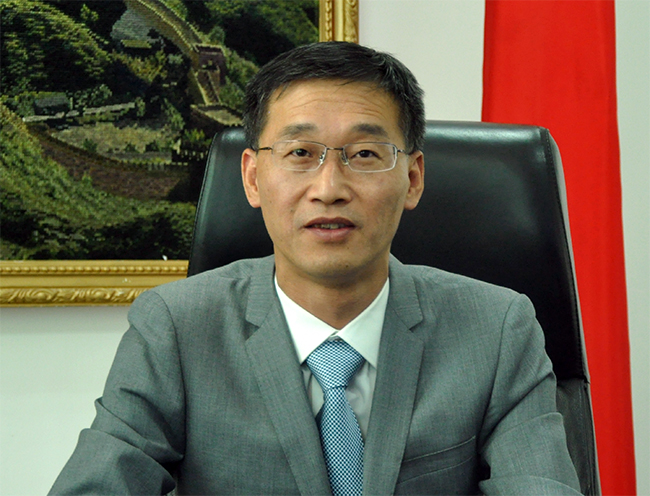At the invitation of Premier Li Keqiang of the State Council of the People’s Republic of China, Chief Executive of the Islamic Republic of Afghanistan Dr. Abdullah Abdullah, paid an official visit to China from May 15 to May 18. This visit was very important as the two countries’ diplomatic relationship has entered the second cycle of 60 years. If President Mohammad Ashraf Ghani’s visit to China in 2014 was a “direction-determing visit”, which determines the Afghan National Unity Government’s relation with China in the new era, CEO Dr. Abdullah’s visit would be a “promoting visit”, which further pushes forward the Strategic and Cooperative Partnership between China and Afghanistan.
I had the honor to accompany CEO Dr. Abdullah throughout the visit and had some prominent feelings as follows:
First, it was a visit to promote the bilateral relations. This visit significantly pushed forward the bilateral relations jointly established by Chinese President Xi Jinping and Afghan President Ghani in the new era. CEO Dr. Abdullah was received with high standard of hospitality, indicating that China attached great importance to the bilateral relations. CEO Dr. Abdullah held separate meetings and talks respectively with President Xi Jinping, Premier Li Keqiang and Vice President Li Yuanchao, attended the welcome ceremony and banquet hosted by Premier Li Keqiang. Leaders of both countries had in-depth exchange of views on issues of common interest and reached broad consensus. The two sides jointly issued the Joint Statement between the People’s Republic of China and the Islamic Republic of Afghanistan which further defined the future direction, connotation and motivation of China–Afghanistan relations, and would be of great significance to consolidate the strategic mutual trust, as well as deepen the mutual beneficial cooperation in various fields.
Second, it was a visit to deepen the mutual trust. The Chinese side expressed its firm support for the inclusive peace and reconciliation process which is “Afghan-led and Afghan-owned” and its willingness to deepen the cooperation with Afghanistan in the fields of counter-terrorism, counter narcotics etc. The Afghan side expressed its support for China’s position on issues related to Taiwan, the South China Sea and other issues concerning China’s core interest and major concerns, and reaffirmed to continue its firm support to China in combating “the Eastern Turkistan Islamic Movement”. The Chinese side valued and welcomed Afghanistan’s desire to obtain membership of Shanghai Cooperation Organization and to join the Asian Infrastructure Investment Bank.
Third, it was a visit to improve connectivity. The Chinese side expressed its willingness to help Afghanistan promote its connectivity with neighboring countries and to connect China’s “One Belt and One Road” initiative with Afghan national strategy for transformation and development. Chinese Foreign Minister Wang Yi and Afghan Foreign Minister Rabbani signed the MOU on Jointly Building the Silk Road Economic Belt and the 21st Century Maritime Silk Road between the Government of the People’s Republic of China and the Government of the Islamic Republic of Afghanistan to specify the objectives, principles and concrete content of cooperation. During the visit, both sides exchanged views about China-Kyrgyzstan-Tajikistan-Afghanistan-Iran Railway project and agreed to stay in communication in this regard. Both sides agreed to strengthen information and communication connectivity, including launching “Afghan Satellite 2” cooperation project.
Fourth, it was a visit to enhance cooperation. China vowed its continuous support to the Afghan peace and reconstruction, and would like to help the Afghan Government to formulate its national infrastructure plan, and set priority areas of bilateral cooperation. The two sides signed six cooperation agreements. China would continue to use its grants to construct the low-cost affordable housing in Afghanistan, implement the Kabul University main building and auditorium project and other projects. Both sides agreed to speed up their work to complete the access protocol for Afghan saffron, and access assessment for Afghan pine nuts, pomegranate and other featured products.
Fifth, it was a visit to encourage exchange. CEO Dr. Abdullah’s visit to Xinjiang, which adjoins Afghanistan, placed a great importance to strengthening friendship and cooperation between the two countries, as it’s the first Afghan leader’s visit to Xinjiang in the past 10 years. China would continue to encourage and support Afghan students to study in China, to support Afghanistan to promote Chinese language teaching, to consider building more Confucius Institute in other cities, and to train 30-50 Afghan agricultural management personnel and technicians in the next three years.
The visit has achieved fruitful results by the joint efforts of the two sides. Many people from different walks of life in both countries have contributed generously to facilitate the development of China-Afghanistan relations. The two sides will earnestly implement the outcome of this visit in the next stage, continue to push China-Afghanistan relations to a new high for the benefit of both countries and their people.
Home » Opinion » “Promoting Visit” to Deepen Friendship Between China and Afghanistan
“Promoting Visit” to Deepen Friendship Between China and Afghanistan
| Yao Jing

